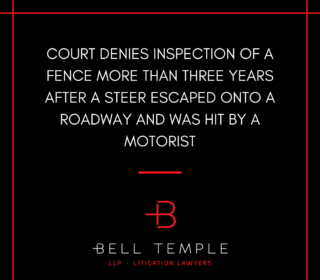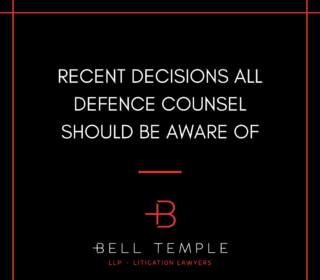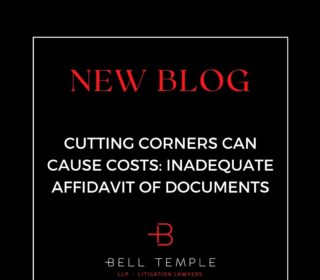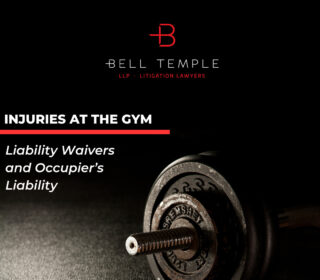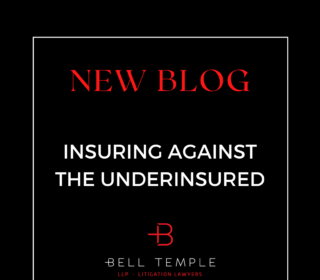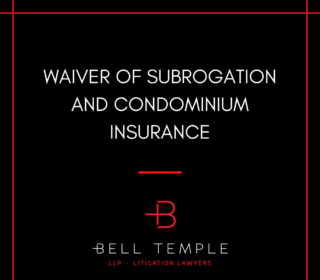1.Mohamud v. Juskey, 2023 ONSC 4414
A case study in the dangers of failing to engage in regular review of files as well as the test for balancing probative value vs. prejudicial effect.
Background
A motor vehicle accident occurred on August 15, 2019 on High Tech Road in Richmond Hill. The plaintiff alleged that the defendant, Christopher Juskey, lost control of his vehicle on a wet road as he was travelling westbound,
crossed over the centre line, and collided with the plaintiff’s vehicle as she was travelling eastbound. The plaintiff alleged a variety of injuries as a result of the collision including a concussion, whiplash, other soft tissue injuries, chronic pain, and psychological injuries including depression.
The plaintiff commenced the action on January 19, 2021. The defendants filed a statement of defence on or about March 18, 2021. The action was set down for trial on or about November 29, 2021. A pre-trial conference was
held on March 27, 2023. The action was scheduled for trial commencing November 20, 2023.
In preparing the file to move forward, the plaintiff obtained three expert reports. The defendants began seeking to obtain defense medicals in January 2023 with these examinations scheduled for February and April 2023. The plaintiff refused to attend any defence medical examinations, reasoning that it was too late in the day for the defence to be seeking to obtain experts’ reports.
The defendants also sought an order from the court to order the plaintiff to disclose digital copies of her social media accounts with Facebook and Instagram. The plaintiff objected on the grounds that there is minimal
probative value to the contents of the social media accounts and that the disclosure of the contents of her Facebook and Instagram accounts would result in substantial prejudice in the form of a significant intrusion on her
personal privacy.
Expert Reports
The court noted the deadline for service of experts’ reports, set out in r. 53.03, is 90 days before pre-trial conference. Rule 53.08(3) provides that where the requirements of r. 53.03 have not been complied with, an
expert may not testify with respect to an issue except with leave of the trial judge. Pursuant to r. 53.08(1) leave may be granted if the non-complying party satisfies the court that:
(a) there is a reasonable explanation for the failure to comply; and, (b) granting leave would not:
(i) cause prejudice to the opposing party that could not be compensated by costs or an adjournment; or,
(ii) cause undue delay in the conduct of the trial.
Defense counsel advised that he did not review the file until January 2023 and was not consulted in scheduling the pre-trial conference. Defense counsel further advised he would have refused to schedule the pre-trial conference so soon had he been consulted. While the court accepted this was an understandable explanation for the failure to schedule the defense medicals, it was not a reasonable one. The court noted defense counsel had over a year to review the file and schedule defense medicals.
The court declined to order the plaintiff to attend defense medicals on the grounds that the defendants were inexcusably inattentive to the file and that inattentiveness to a file was not reasonable.
Relevance Assessment
The court noted that the Rules of Civil Procedure require parties to a civil action to disclose all relevant and material documents in their possession, control or power, with there being a very low threshold to establish relevance. The test for relevance is that the evidence is relevant if, as a matter of logic and human experience, it renders a fact in an issue more or less likely than it would be without the evidence.
The wrinkle in this case for the court was that relevancy had to be balanced with the privacy argument. The court noted that Ontario civil law appeared to lack a recognized legal framework against which to analyze assertions of
privacy in the context of a disclosure application other than in those circumstances in which a party resisting disclosure may have a sustainable claim to privilege.
Thus, the court engaged in a prejudice analysis, in which it balanced the probative value of the records sought against the prejudice that would occur to the party resisting disclosure. The court accepted that the pleadings had placed the plaintiff’s functionality, enjoyment of life, and ability to work in issue. Based on several photographs obtained from the public profile of the plaintiff’s Facebook account by the defendants, the plaintiff was on a beach on a holiday. The court sided with the defendants that the plaintiff’s private Facebook and Instagram accounts would likely contain content similar to that shared in the public areas of those applications.
However, the court stopped short of granting blanket access to the plaintiff’s social media accounts, reasoning this would tip the probative-prejudice balance in favour of the plaintiff. Rather, the court ordered the plaintiff to
produce an affidavit listing all of the photographs in her possession, control or power, including those posted on social media accounts, relevant to the live issues in the proceedings.
2. Rupani v. Willett, 2023 ONSC 3743
A case presenting some clarifications regarding the test for discovering non-parties.
Background
The motor vehicle accident in question occurred on July 30, 2018. A statement of claim was issued on January 15, 2020 on behalf of Malaika Khoja Rupani and her mother, Ashraf Kherani.
In the claim, Ms. Rupani alleges that she sustained severe internal and external injuries as a result of the negligence of the Defendants in connection with the accident, which have caused Ms. Rupani to incur, and to continue to incur, “a loss of income, a loss of earning capacity, [and] a loss of competitive advantage.” Ms. Rupani was an employee of The Master Group Inc. at the time of the accident.
In their statement of defence, the Defendants denied that Ms. Rupani sustained the injuries, losses, and damages as alleged in the claim, as well as a loss of earning capacity, loss of competitive advantage in the employment field, loss of income, or loss of income earning potential as a result of injuries allegedly sustained in the accident.
Examinations for discovery of Ms. Rupani took place on September 29, 2020 and May 6, 2021. The Court noted that the Defendants asked Ms. Rupani a total of 1268 questions over the two days of examinations.
The Defendants argued that, during the examinations, Ms. Rupani was unclear about several key details regarding her employment at Master Group, including how long she remained employed at Master Group following the accident, her ability to perform her job post-accident, and for what reason she was terminated.
Counsel for both parties confirmed during the hearing that the only undertakings asked of Ms. Rupani regarding Master Group were for Ms. Rupani to provide contact information and names for individuals at Master Group and to produce her employment file. It was confirmed that Ms. Rupani had fulfilled these undertakings.
Mediation took place on October 4, 2021.
In a letter dated April 22, 2022, counsel to the Defendants stated that the case was not ready for trial, and they anticipated bringing a motion to examine Ms. Rupani’s direct supervisor, Sue Dajia. The defendants then brought a motion under rule 31.10 of the Rules of Civil Procedure, seeking the court’s leave to examine two non-parties for discovery— Ms. Rupani’s supervisor and a human resources representative.
Granting Leave to Discover Non-Parties
The Court identified two factors in determining whether to grant leave for discovery of non-parties:
- There must be a reason to believe that the person to be examined has information about a material issue in the action.
- The defendants have been unable to obtain the information sought from other persons whom they were entitled to examine for discovery.
The court found that the defendants satisfied the first part of the test as it was reasonable that Ms. Rupani’s supervisor and a human resources representative would have information relevant to a material issue in the
action. However, the court found that the defendants failed to meet the second part of the test. The court, cited case law, stating, “there must be a refusal, actual or constructive, to obtain the information before the applicant will be able to meet the onus.”
The court rejected the defendants’ argument that Ms. Rupani constructively refused to obtain information during her examinations for discovery. The court noted that Ms. Rupani answered the questions to the best of her ability. What proved fatal to the defendants was their failure to ask Ms. Rupani to undertake to inquire of Master Group employees to see whether they had additional information that could be provided in response to the questions that she was unable to answer. The court also noted that Ms. Rupani had already satisfied her undertakings. The court concluded that Ms. Rupani had not shown any unwillingness to attempt to secure information from Master Group.
Ultimately, the court dismissed the defendants’ motion with the provision that the defendants were entitled to re-examine Ms. Rupani concerning the produced employment record. If Ms. Rupani could not provide answers to
specific questions, she could undertake to obtain information from her former employer
3.Case v. Pattison, 2023 ONCA 529
A decision cautioning reliance on length of time and intervening factors in absolving an entity of liability.
Background
On January 20, 2015, at approximately 7:09 p.m. in the Town of Milton, the plaintiff, Christopher Case, was catastrophically injured as he walked across the road and was struck by the car driven by James Pattison and owned by Cara Pattison. The plaintiffs and the Pattison defendants claimed damages against the Town of Milton based on allegedly inadequate street lighting because of a missing luminaire. The Town commenced a third-party claim against Milton Hydro for contribution and indemnity, alleging that Milton Hydro negligently removed the luminaire. Milton Hydro defended and denied removing the luminaire.
Milton Hydro and the Town of Milton brought competing motions for summary judgment. The motion judge allowed Milton Hydro’s motion for summary judgment and dismissed the third-party claim. The motion judge
ruled that Milton Hydro did not owe an ongoing duty of care to either the plaintiff or the Town of Milton respecting the adequacy or operation of street lighting potentially removed four years prior when the Town of Milton’s inspections had ample opportunity to discovery the missing luminaire.
The Town of Milton appealed the motion judge’s decision.
Errors in the motion judge’s decision
The appeal court found that the motion judge failed to conduct the requisite legal analysis. The court held that the motion judge should have first determined whether Milton Hydro owed a duty of care to the plaintiff. If the
motion judge was satisfied that Milton Hydro owed the plaintiff a duty of care and breached that standard of care, the motion judge would then need to consider causation. The question for the court, that the motion judge failed to consider, was whether the removal of the luminaire and the subsequent injury of the plaintiff was a foreseeable result of Milton Hydro’s actions. If the harm to the plaintiff was not a reasonable and foreseeable result of the defendant’s conduct, then the harm would be too remote for the defendant’s negligence to have been the cause.
Additionally, the motion judge did not consider whether Milton Hydro’s alleged removal of the luminaire was negligent, regardless of any duty of care owed by the Town of Milton to the plaintiff. The motion judge should
have, but also failed to, consider whether Milton Hydro’s alleged removal of the luminaire would not be an ongoing contributing cause to the accident and the plaintiff’s injuries. The court stated that intermediate and parallel events, such as the Town of Milton’s inspections, did not absolve Milton Hydro of liability for its negligent act in removing the luminaire.
The motion judge also noted that the injury occurred four years after removing the luminaire. However, the appeal court said that the passage of time alone does not necessarily determine foreseeability or proximity under the duty of care analysis or the causation and intervening act analysis.
The court set aside the motion judge’s decision and remitted the matter for trial on the issues of duty of care, causation, and determination of which party removed the luminaire.
4. Wawanesa Mutual Insurance Company v. Motor Vehicle Accident Claims Fund, 2023 ONSC 4779
A reminder on the standard of review for overturning administrative and arbitrator decisions.
Background
Jeremy Bragdon was involved in a catastrophic snowmobile accident, where he sustained injuries. Mr. Bragdon claimed insurance coverage under his mother’s motor vehicle insurance policy with Wawanesa Mutual Insurance Company. Wawanesa eventually paid some benefits to Mr. Bragdon, but the insurance company discovered that the snowmobile was uninsured. Criminal charges for operating the snowmobile while intoxicated were filed against him in connection with the accident but were later withdrawn. The Respondent, the Motor Vehicle Accident Claims Fund, accepted priority of insurance coverage for Mr. Bragdon’s accident benefits claim. There were three significant time periods:
(1) March 22, 2014 (date of accident) to December 11, 2014 (date of withdrawal of criminal charge against Mr. Bragdon);
(2) December 12, 2014 to March 30, 2016 (date of Mr. Bragdon’s admission that he did not have insurance on the snowmobile and was aware that it was not insured at the time of the accident); and
(3) after March 30, 2016.
The Appellant requested reimbursement from the Respondent of the sum of $944, 408.18 in benefits it had paid to or on behalf of Mr. Bragdon since March 22, 2014. The Respondent reimbursed the Appellant the amount of
$865,662.00 for the second time period which was after the withdrawal of the criminal charge and before the admission that the snowmobile was not insured. The Respondent declined reimbursement of the amount of $78,746.18 for the first time period and third time period on the grounds that the Appellant did not pay benefits in accordance with the Statutory Accident Benefits (“SABS”) provisions. The Respondent reimbursed the Appellant defence costs in the amount of $39,161.49 which the Appellant had incurred in relation to various proceedings initiated by Mr. Bragdon, and interest in the amount of $32,036.48.
The parties proceeded to arbitration given the Respondent did not fully reimburse the Appellant. The arbitrator partially denied reimbursement to Wawanesa, so the insurance company appealed to the Ontario Superior Court of Justice.
Standard of Review
The court noted the standard of review of an administrative decision in considering questions of law is correctness and in considering questions of fact is palpable overriding error.
The arbitrator found that Wawanesa failed to re-consider entitlement to benefits after Mr. Bragdon presented evidence that “reliably established the snowmobile was not insured.” Wawanesa then sent letters to the Fund, demanding it assume priority for coverage because there was no available motor vehicle insurance policy. The arbitrator also found that Wawanesa had grossly mishandled its adjusting responsibilities. The Statutory Accident Benefits (SABS) provisions stipulate that the insurer is not required to pay certain benefits when an occupant of an automobile knew or should have known that the driver was operating the automobile without the owner’s consent.
The appeal court said the arbitrator correctly applied the law and the test of bad faith and gross mishandling. Under s. 31(1) and 31(3) of the SABS,
31.(3) The insurer shall hold in trust any amounts payable as an income replacement benefit, a non-earner benefit or a benefit under section 21, 22 or 23 to a person who sustains an impairment as a result of an accident if,
(a) at the time of the accident, the person was engaged in, or was an occupant, of an automobile that was being used in connection with, an act for which the person is charged with a criminal offence…
(5) In this section, “criminal offence” means,
(a) operating an automobile while the ability to operate the automobile is impaired by alcohol or a drug or a combination of alcohol and a drug,
As criminal charges were filed against Mr. Bragdon after the accident in relation to the alleged alcohol consumption during the operation of the motor vehicle, the arbitrator said Wawanesa should have held in trust
the amounts payable to Mr. Bragdon following his criminal charge. However, Wawanesa failed to do so. The arbitrator concluded that Wawanesa was grossly negligent in failing to withhold certain benefits in trust at the outset of the claim.
The arbitrator noted that Wawanesa was aware of Mr. Bragdon’s repeated denial that he was criminally charged, but there were concerns that Mr. Bragdon may have given false information about the criminal charge. Despite these concerns, Wawanesa continued to adjust and pay Mr. Bragdon’s full benefits.
The appeal court ruled that the arbitrator correctly applied the law, and no palpable and overriding error was made in his determination that Waanesa should have held in trust amounts payable to Mr. Bragdon. The court upheld the arbitrator’s decision and dismissed the appeal.
5.Czarneski v. Floating Lodges of Sioux Narrows Inc. et al., 2023 ONSC 4285
A case study of the dangers for individuals of failing to defend a claim
Background
In July of 2018, the plaintiffs were vacationing as guests on a houseboat owned by Floating Lodges and chartered by the third party, Eric Schwartz. During disembarking via a wooden gang plank, a plank broke and the plaintiff Jeremy Czarneski fell into the water, injuring his knee and foot. He sustained a ruptured patellar tendon and was transported to hospital via ambulance where he was stabilized. Upon returning home to the United States, he underwent surgery to repair the tendon. He used a wheelchair, crutches, and a cane before he was able to walk unaided near the end of 2018.
The plaintiffs settled their personal injury action against the defendant, Floating Lodges of Sioux Narrows Inc., for a total of $175,000.00 inclusive of disbursements, taxes, and costs. In the course of litigation, the defendant issued a third-party claim against Eric Schwartz. The third-party claim sought contribution and indemnity to the extent of the plaintiff’s injuries based on the charter contract. As well, the claim made various allegations against the third party, as the chartering individual, was in full possession and control of the vessel and was negligent in following the safety briefing from the defendant that included procedures for boarding and re-boarding the houseboat and operation of all safety equipment, as well as in monitoring his passengers, inspecting the wooden gang plank, advising the passengers about alternate means of accessing the houseboat, and failing to dock it safely.
The plaintiffs state that at the time of the injury, July 3, 2018, the gang planks were improperly placed against the side of the houseboat at a much higher angle than intended, leading to the breakage of one plank, and Mr.
Czarneski falling into the water from a greater height. The plaintiffs claim that Mr. Schwartz did not give them a safety briefing about the vessel.
On December 9, 2020, Mr. Schwartz’s insurer advised counsel for the defendant and Mr. Schwartz that it would not offer a defence or provide insurance coverage. Counsel for the defendant wrote to Mr. Schwartz on February 12, 2021 advising that he needed to file a defence to the third party claim and if he did not do so, he was at risk of a default judgment. Counsel also asked Mr. Schwartz to advise if he intended to retain counsel in Ontario. Mr. Schwartz took no steps to defend the third-party claim and was noted in default on April 10, 2021.
The plaintiff testified that at the time of the injury, the gang planks were improperly placed against the side of the houseboat at a much higher angle than intended, leading to the breakage of one plank, and the plaintiff falling into the water from a greater height. The Plaintiff also claimed that the third party did not give them a safety briefing about the vessel.
In its third-party claim, Floating Lodges alleged that Schwartz was negligent in monitoring his passengers, inspecting the wooden gangplank, advising the passengers about alternate means of accessing the houseboat and failing to dock it safely.
Court’s Analysis
The Court found that the plaintiff’s examination for discovery established a basis for a negligence claim against the third party, and the charter boat agreement showed that he agreed to indemnify the defendant against any claims made.
The Court noted that the plaintiff was 40 years old at the time of the injury, working as a landscape and construction contractor. He experienced changes in his life due to his knee injury, including being limited to more
sedentary work and losing a competitive advantage in the workforce. His family also described disruptions to their relationship that prompted them to seek counselling.
The court was satisfied that the amount claimed, $175,000, represented a reasonable assessment of the damages when general and special damages and the Family Law Act claims for loss of care, guidance, and companionship of family members are considered.
Accordingly, the court issued a judgment against the third-party Eric Schwartz for $175,000 and costs fixed at $10,000.

